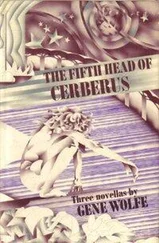The dogs were chained in stalls, with dividers too high for them to see the dogs on either side of them and wide aisles between the rows of stalls. They were all fighting dogs, but of every size from ten-pound terriers to mastiffs larger than small horses, brutes with heads as misshappen as the growths that appear on old trees and jaws that could sever both a man’s legs at a mouthful. The din of the barking was incredible, a solid substance that shook us as we descended the ladder, and at the bottom I took Phaedria’s arm and tried to indicate by signs—since I was certain that we were wherever we were without permission—that we should leave at once. She shook her head and then, when I was unable to understand what she said even when she exaggerated the movements of her lips, wrote on a dusty wall with her moistened forefinger: They do this all the time—a noise in the street—anything .
Access to the floor below was by stairs, reached through a heavy but unbolted door which I think had been installed largely to exclude the din. I felt better when we had closed it behind us even though the noise was still very loud. I had fully come to myself by this time, and I should have explained to David and Phaedria that I did not know where I was or what we were doing there, but shame held me back. And in any event I could guess easily enough what our purpose was. David had asked about the location of money, and we had often talked—talk I had considered at the time to be more than half-empty boasting—about a single robbery that would free us from the necessity of further petty crime.
Where we were I discovered later when we left, and how we had come to be there I pieced together from casual conversations. The building had been originally designed as a warehouse, and stood on the rue des Egouts close to the bay. Its owner supplied those enthusiasts who staged combats of all kinds for sport, and was credited with maintaining the largest assemblage of these creatures in the Départment. Phaedria’s father had happened to hear that this man had recently put some of his most valuable stock on ship, had taken Phaedria when he called on him, and, since the place was known not to open its doors until after the last Angelus, we had come the next day a little after the second and entered through one of the skylights.
I find it difficult to describe what we saw when we descended from the floor of the dogs to the next, which was the second floor of the building. I had seen fighting slaves many times before when Mr. Million, David, and I had traversed the slave market to reach the library, but never more than one or two together, heavily manacled. Here they lay, sat, and lounged everywhere, and for a moment I wondered why they did not tear one another to pieces, and the three of us as well. Then I saw that each was held by a short chain stapled to the floor, and it was not difficult to tell from the scraped and splintered circles in the boards just how far the slave in the center could reach. Such furniture as they had, straw pallets and a few chairs and benches, was either too light to do harm if thrown or very stoutly made and spiked down. I had expected them to shout and threaten us as I had heard they threatened each other in the pits before closing, but they seemed to understand that as long as they were chained, they could do nothing. Every head turned toward us as we came down the steps, but we had no food for them, and after that first examination they were far less interested in us than the dogs had been.
“They aren’t people, are they?” Phaedria said. She was walking erectly as a soldier on parade now, and looking at the slaves with interest; as I was studying her, it occurred to me that she was taller and less plump than the “Phaedria” I pictured to myself when I thought of her. She was not just a pretty but a beautiful girl. “They’re a kind of animal, really,” she said.
From my studies I was better informed, and I told her that they had been human as infants—in some cases even as children or older—and that they differed from normal people only as a result of surgery (some of it on their brains) and chemically induced alterations in their endocrine systems. And of course in appearance because of their scars.
“Your father does that sort of thing to little girls, doesn’t he? For your house?”
David said, “Only once in a while. It takes a lot of time, and most people prefer normals, even when they prefer pretty odd normals.”
“I’d like to see some of them. I mean the ones he’s worked on.”
I was still thinking of the fighting slaves around us and said, “Don’t you know about these things? I thought you’d been here before. You knew about the dogs.”
“Oh, I’ve seen them before, and the man told me about them. I suppose I was just thinking out loud. It would be awful if they were still people.”
Their eyes followed us, and I wondered if they could understand her.
The ground floor was very different from the ones above. The walls were paneled; there were framed pictures of dogs and cocks and of the slaves and curious animals. The windows, opening toward Egouts Street and the bay, were high and narrow and admitted only slender beams of the bright sunlight to pick out of the gloom the arm alone of a rich red-leather chair, a square of maroon carpet no bigger than a book, a half-full decanter. I took three steps into this room and knew that we had been discovered. Striding toward us was a tall, high-shouldered young man—who halted, with a startled look, just when I did. He was my own reflection in a gilt-framed pier glass, and I felt the momentary dislocation that comes when a stranger, an unrecognized shape, turns or moves his head and is some familiar friend glimpsed, perhaps for the first time, from outside. The sharp-chinned, grim-looking boy I had seen when I did not know him to be myself had been myself as Phaedria and David, Mr. Million and my aunt, saw me.
“This is where he talks to customers,” Phaedria said. “If he’s trying to sell something he has his people bring them down one at a time so you don’t see the others, but you can hear the dogs bark even from way down here, and he took Papa and me upstairs and showed us everything.”
David asked, “Did he show you where he keeps the money?”
“In back. See that tapestry? It’s really a curtain, because while Papa was talking to him, a man came who owed him for something and paid, and he went through there with it.”
The door behind the tapestry opened on a small office, with still another door in the wall opposite. There was no sign of a safe or strongbox. David broke the lock on the desk with a pry bar from his tool kit, but there was only the usual clutter of papers, and I was about to open the second door when I heard a sound, a scraping or shuffling, from the room beyond.
For a minute or more none of us moved. I stood with my hand on the latch. Phaedria, behind me and to my left, had been looking under the carpet for a cache in the floor—she remained crouched, her skirt a black pool at her feet. From somewhere near the broken desk I could hear David’s breathing. The shuffling came again, and a board creaked. David said very softly, “It’s an animal.”
I drew my fingers away from the latch and looked at him. He was still gripping the pry bar and his face was pale, but he smiled. “An animal tethered in there, shifting its feet. That’s all.”
I said, “How do you know?”
“Anybody in there would have heard us, especially when I cracked the desk. If it were a person he would have come out, or if he were afraid he’d hide and be quiet.”
Phaedria said, “I think he’s right. Open the door.”
“Before I do, if it isn’t an animal?”
David said, “It is.”
“But if it isn’t?”
Читать дальше










